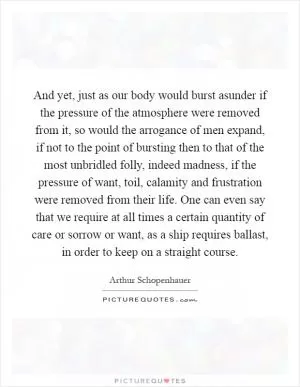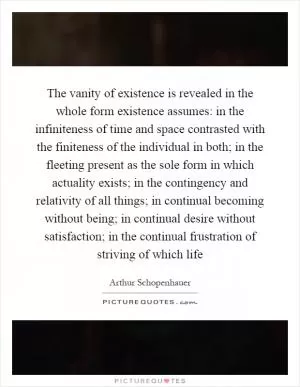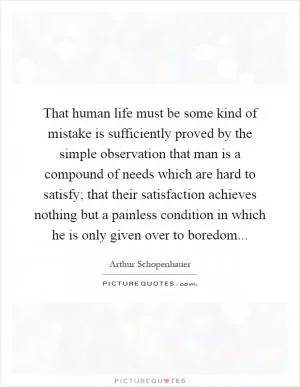Advertisements
Arthur Schopenhauer Quotes
Advertisements
Advertisements
Advertisements
Advertisements
 Friendship Quotes
Friendship Quotes
 Love Quotes
Love Quotes
 Life Quotes
Life Quotes
 Funny Quotes
Funny Quotes
 Motivational Quotes
Motivational Quotes
 Inspirational Quotes
Inspirational Quotes
Advertisements
Text Quotes
Pride works _from within_; it is the direct appreciation of oneself. Vanity is the desire to arrive at this appreciation indirectly, from without (Arthur Schopenhauer Quotes)
Every generation, no matter how paltry its character, thinks itself much wiser than the one immediately preceding it, let alone those that are more remote (Arthur Schopenhauer Quotes)
I believe a person of any fine feeling scarcely ever sees a new face without a sensation akin to a shock, for the reason that it presents a new and surprising combination of unedifying elements (Arthur Schopenhauer Quotes)
Pride is generally censured and decried, but mainly by those who have nothing to be proud of (Arthur Schopenhauer Quotes)
To use many words to communicate few thoughts is everywhere the unmistakable sign of mediocrity. To gather much thought into few words stamps the man of genius (Arthur Schopenhauer Quotes)
A man’s delight in looking forward to and hoping for some particular satisfaction is a part of the pleasure flowing out of it, enjoyed in advance. But this is afterward deducted, for the more we look forward to anything the less we enjoy it when it comes (Arthur Schopenhauer Quotes)
It is only a man’s own fundamental thoughts that have truth and life in them. For it is these that he really and completely understands. To read the thoughts of others is like taking the remains of someone else’s meal, like putting on the discarded clothes of a stranger (Arthur Schopenhauer Quotes)
There are, first of all, two kinds of authors: those who write for the subject’s sake, and those who write for writing’s sake... The truth is that when an author begins to write for the sake of covering paper, he is cheating the reader; because he writes under the pretext that he has something to say (Arthur Schopenhauer Quotes)
The memory should be specially taxed in youth, since it is then that it is strongest and most tenacious. But in choosing the things that should be committed to memory the utmost are and forethought must be exercised; as lessons well learnt in youth are never forgotten (Arthur Schopenhauer Quotes)
Truth that is naked is the most beautiful, and the simpler its expression the deeper is the impression it makes; this is partly because it gets unobstructed hold of the hearer’s mind without his being distracted by secondary thoughts, and partly because he feels that here he is not being corrupted or deceived by the arts of rhetoric, but that the whole effect is got from the thing itself (Arthur Schopenhauer Quotes)
Nothing in life gives a man so much courage as the attainment or renewal of the conviction that other people regard him with favor; because it means that everyone joins to give him help and protection, which is an infinitely stronger bulwark against the ills of life than anything he can do himself (Arthur Schopenhauer Quotes)
How very paltry and limited the normal human intellect is, and how little lucidity there is in the human consciousness, may be judged from the fact that, despite the ephemeral brevity of human life, the uncertainty of our existence and the countless enigmas which press upon us from all sides, everyone does not continually and ceaselessly philosophize, but that only the rarest of exceptions do (Arthur Schopenhauer Quotes)
That the outer man is a picture of the inner, and the face an expression and revelation of the whole character, is a presumption likely enough in itself, and therefore a safe one to go on; borne out as it is by the fact that people are always anxious to see anyone who has made himself famous. Photography offers the most complete satisfaction of our curiosity (Arthur Schopenhauer Quotes)
Just as the largest library, badly arranged, is not so useful as a very moderate one that is well arranged, so the greatest amount of knowledge, if not elaborated by our own thoughts, is worth much less than a far smaller volume that has been abundantly and repeatedly thought over (Arthur Schopenhauer Quotes)
And yet, just as our body would burst asunder if the pressure of the atmosphere were removed from it, so would the arrogance of men expand, if not to the point of bursting then to that of the most unbridled folly, indeed madness, if the pressure of want, toil, calamity and frustration were removed from their life. One can even say that we require at all times a certain quantity of care or sorrow or want, as a ship requires ballast, in order to keep on a straight course (Arthur Schopenhauer Quotes)
We will gradually become indifferent to what goes on in the minds of other people when we acquire a knowledge of the superficial nature of their thoughts, the narrowness of their views and of the number of their errors. Whoever attaches a lot of value to the opinions of others pays them too much honor (Arthur Schopenhauer Quotes)
What give all that is tragic, whatever its form, the characteristic of the sublime, is the first inkling of the knowledge that the world and life can give no satisfaction, and are not worth our investment in them. The tragic spirit consists in this. Accordingly it leads to resignation (Arthur Schopenhauer Quotes)
The actual life of a thought lasts only until it reaches the point of speech... As soon as our thinking has found words it ceases to be sincere... When it begins to exist in others it ceases to live in us, just as the child severs itself from its mother when it enters into its own existence (Arthur Schopenhauer Quotes)
One can never read too little of bad, or too much of good books: bad books are intellectual poison; they destroy the mind. In order to read what is good one must make it a condition never to read what is bad; for life is short, and both time and strength limited (Arthur Schopenhauer Quotes)
If children were brought into the world by an act of pure reason alone, would the human race continue to exist? Would not a man rather have so much sympathy with the coming generation as to spare it the burden of existence, or at any rate not take it upon himself to impose that burden upon it in cold blood? (Arthur Schopenhauer Quotes)
A poet or philosopher should have no fault to find with his age if it only permits him to do his work undisturbed in his own corner; nor with his fate if the corner granted him allows of his following his vocation without having to think about other people (Arthur Schopenhauer Quotes)
Students and scholars of all kinds and of every age aim, as a rule, only at information, not insight. They make it a point of honour to have information about everything, every stone, plant, battle, or experiment and about all books, collectively and individually. It never occurs to them that information is merely a means to insight, but in itself is of little or no value (Arthur Schopenhauer Quotes)
The best consolation in misfortune or affliction of any kind will be the thought of other people who are in a still worse plight than yourself; and this is a form of consolation open to every one. But what an awful fate this means for mankind as a whole! We are like lambs in a field, disporting themselves under the eye of the butcher, who chooses out first one and then another for his prey (Arthur Schopenhauer Quotes)
The vanity of existence is revealed in the whole form existence assumes: in the infiniteness of time and space contrasted with the finiteness of the individual in both; in the fleeting present as the sole form in which actuality exists; in the contingency and relativity of all things; in continual becoming without being; in continual desire without satisfaction; in the continual frustration of striving of which life (Arthur Schopenhauer Quotes)
Of all the intellectual faculties, judgment is the last to mature. A child under the age of fifteen should confine its attention either to subjects like mathematics, in which errors of judgment are impossible, or to subjects in which they are not very dangerous, like languages, natural science, history, etc (Arthur Schopenhauer Quotes)
Optimism is not only a false but also a pernicious doctrine, for it presents life as a desirable state and man’s happiness as its aim and object. Starting from this, everyone then believes he has the most legitimate claim to happiness and enjoyment. If, as usually happens, these do not fall to his lot, he believes that he suffers an injustice, in fact that he misses the whole point of his existence (Arthur Schopenhauer Quotes)
Every woman while she would be ready to die of shame if surprised in the act of generation, nonetheless carries her pregnancy without a trace of shame and indeed with a kind of pride. The reason is that pregnancy is in a certain sense a cancellation of the guilt incurred by coitus; thus coitus bears all the shame and disgrace of the affair, while pregnancy, which is so intimately associated with it, stays pure and innocent and is indeed to some extent sacred (Arthur Schopenhauer Quotes)
The art of not reading is a very important one. It consists in not taking an interest in whatever may be engaging the attention of the general public at any particular time. When some political or ecclesiastical pamphlet, or novel, or poem is making a great commotion, you should remember that he who writes for fools always finds a large public. A precondition for reading good books is not reading bad ones: for life is short (Arthur Schopenhauer Quotes)
That human life must be some kind of mistake is sufficiently proved by the simple observation that man is a compound of needs which are hard to satisfy; that their satisfaction achieves nothing but a painless condition in which he is only given over to boredom (Arthur Schopenhauer Quotes)
The greatest wisdom is to make the enjoyment of the present the supreme object of life; because that is the only reality, all else being merely the play of thought. On the other hand, such a course might just as well be called the greatest folly: for that which in the next moment exists no more, and vanishes utterly, like a dream, can never be worth a serious effort (Arthur Schopenhauer Quotes)





























